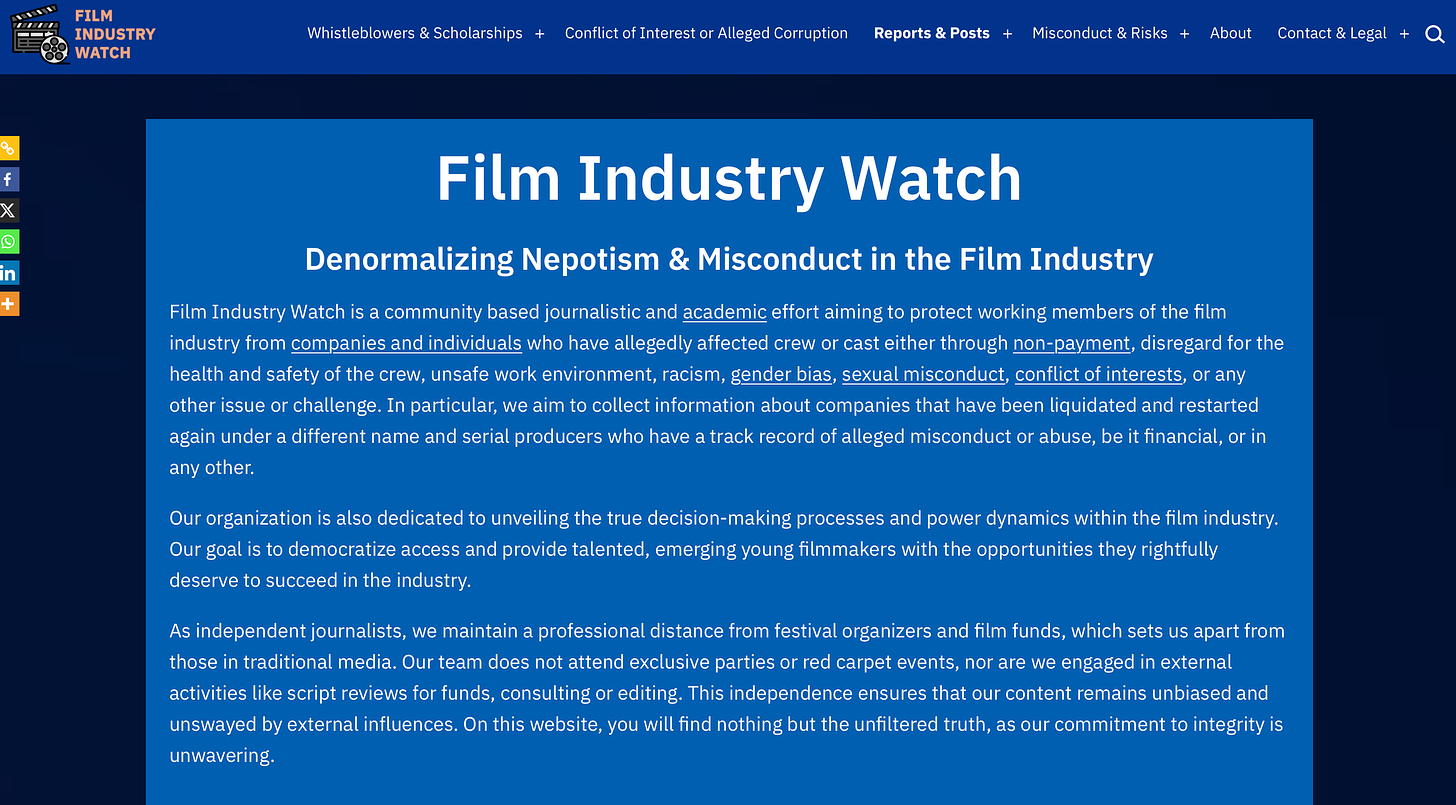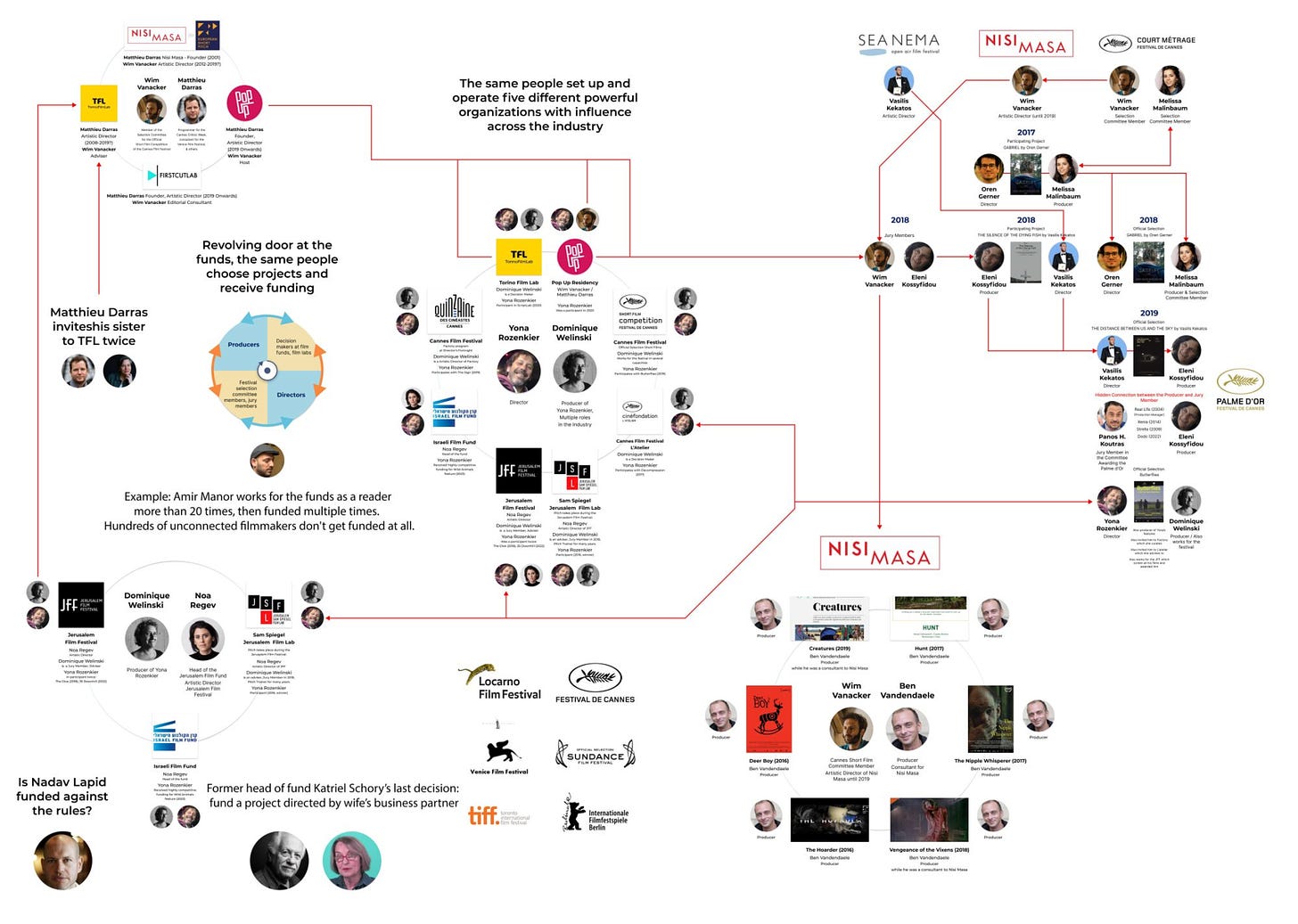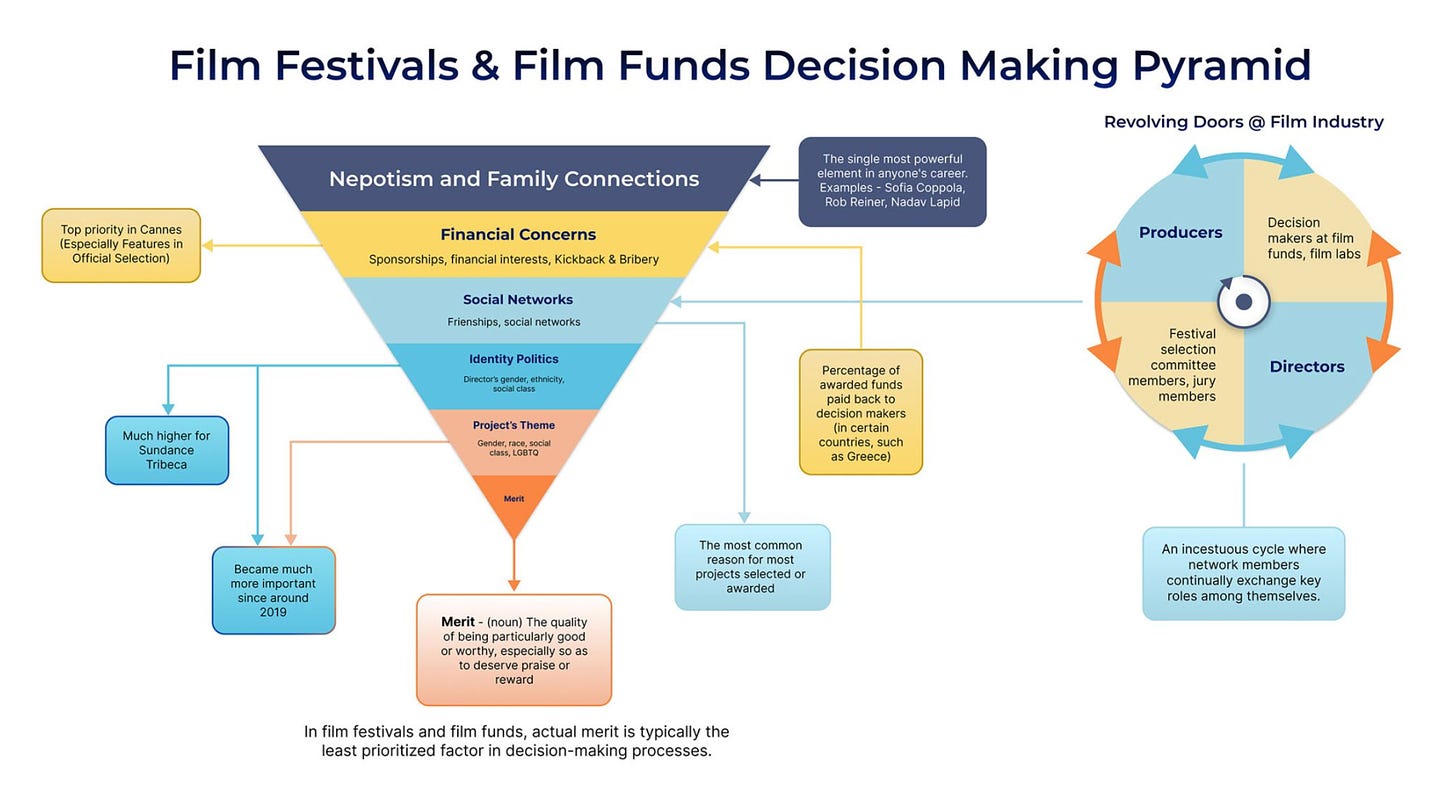It’s been more than six-and-a-half years since the New York Times and the New Yorker blew the lid off Harvey Weinstein’s predations, initiating the era of #MeToo. Many, however, would argue that little has changed since. The sacrificing of a few obligatory sacred cows notwithstanding, the entertainment industry remains rife with misconduct of all kinds.
In the absence of any official action by studios, agencies or trade organizations, a new grassroots operation by the name of Film Industry Watch has emerged. A cursory glance at their site and it’s quite clear they mean business — but they are also casting an uncharacteristically wide net. No less than Chris Gore of Film Threat recently discussed the site on his podcast.
Hollywood Heretic reached out to the group’s spokesperson, Gabriel Moreau, for some background on Film Industry Watch’s genesis and aspirations. — WM
WM: Film Industry Watch seemed to come out of the blue to me — and it’s not yet on the radar of most people I talk to. Can you talk about how the organization came to be and roughly how it’s structured? Meaning is it a 501c3? Do you accept donations? Or is it just a grassroots service to the industry?
GM: Film Industry Watch is a grassroots service dedicated to the industry, created and supported by aspiring filmmakers who have encountered the industry's corrupt nature and realized that most people, including the audience and the majority of filmmakers, are unaware of it. Many filmmakers do not know, for instance, that film submission fees for many (if not most) festivals are essentially a money-making scheme (or scam), and that most submitted films are not watched. This issue is particularly prevalent in the largest festivals, like Sundance, where 99% of film submissions are either not watched or are merely skimmed over by very low-paid employees or volunteers. The real list of films that are actually viewed by the programmers consists of maybe only 200-300 films, submitted by distribution companies, friends, and family, and selections are made exclusively from this pool of submissions. If you do not have contacts within the festival, do not waste your money.
WM: For as long as I can remember, there have been Hollywood scandals involving misdeeds which either went unpunished or where one or several malefactors were punished so that others would not be. A case in point would be Harvey Weinstein and the #MeToo moment which appeared to be on the Vanguard of industry change six years ago — and then everything quietly went back to the status quo. Am I reading it right? And if so, how do you propose to change an industry which appears so resolutely resistant to change?
GM: I don’t believe this is the case at all. Things have reverted to the status quo regarding nepotism and corruption, with people being hired based on contacts rather than merit, etc. However, concerning the #MeToo movement, from conversations with professionals in the industry (in LA), in many cases men no longer have one-on-one meetings with women unless someone else is present, or they meet in an open space, or outside in the corridor rather than in an office. Making a simple "dad joke" can lead to being canceled or fired, and if you’re the director, it could result in the entire project being canceled. Everyone is treading carefully, and when it comes to comedy, it’s nearly impossible to write comedy or make most jokes for fear of offending someone and getting canceled. So #Me too brought some much needed positives but some negatives as well.
WM: Your call for a “safer and more ethical film industry” is a big swing. Your site asks people to report on everything from sexual misconduct to racism and sexism to health and safety violations to financial scams to nepotism to alleged corruption and cronyism at major international film festivals and even gender bias at the Jerusalem Film Lab. It’s really a broad, global focus. Are you at risk of biting off too much and spreading yourselves too thin? To play devil’s advocate, some might ask, “Why don’t you start small and manageable where you know you can make a difference? Focus on Hollywood, and on specific issues in Hollywood and then grow out from there?” How would you answer that?
GM: All the articles that we publish on the site originate from readers' submissions. If a submission addresses one of these issues, is compelling, and is supported by evidence, we will publish it. Since light is the best disinfectant, we welcome submissions from around the world on any of these topics and don’t worry about spreading ourselves too thin.
WM: Talk about your $25,000 “Whistleblower Fund.” For a new, grassroots organization — that’s an eye-catcher. You’re offering between $100 and $5000 for information which leads to significant changes and/or court proceedings. How was this fund raised? And what determines whether a whistleblower qualifies for how much of a reward?
GM: The founders of the site and some supporters have pledged certain amounts, but we are still awaiting a significant story that would warrant such payments. Until now, our readers have volunteered information without requesting anything in return, but we are prepared to compensate those who provide major stories. For instance, if someone with years of experience inside the festivals comes forward with firsthand, astonishing stories of corruption, supported by evidence, we will certainly make these payments. Examples include an award being given at a festival in exchange for a bribe, or a short film being selected for a major festival due to under-the-table payments, complete with the names of the people involved and proof. We offer this incentive to encourage individuals to come forward. We do not publish anything on the site without some form of proof, such as screenshots of conversations or public credits that reveal a conflict of interest. The most significant story we have uncovered involved a film that won the short Palme d’Or (The Distance Between Us and the Sky by Vasilis Kekatos), which was produced by the same producer who had produced all the feature films of one of the jury members giving the award. Additionally, the director of that film, Vasilis Kekatos, had previously invited a Cannes committee member (Wim Vanacke) to serve on the jury of a festival he organized a year earlier, and that same committee member had invited the director to a film lab he led as an artistic director. So there was a relationship there, going back and forth, for several years. This win raised several red flags, supported by public information. For such stories, we are willing to make a payment. We are particularly interested in festivals like Sundance, Locarno, Berlin, TIFF, etc., because those are the ones that ultimately matter.
WM: A fair portion of your site is dedicated to mapping the allegedly unethical self-dealing by fund managers and film festival organizers, whom you argue constitute a revolving door of insider influence peddling. That’s a topic I’ve never seen covered in the trades or even discussed privately. Can you speak more about how and why this particular topic gained traction with your organization?
GM: Many contributors to our website are based in Europe, where the film industry is predominantly publicly funded, meaning films receive their financing from government sources. Unfortunately, it turns out that these funding bodies are extremely corrupt across much of Europe. We have received dozens of emails from individuals across the continent, with comments like “it’s the same in Greece,” “It’s the same in Italy,” “It’s the same in Norway,” indicating that the situation is broadly similar everywhere. We're talking about the circulation of hundreds of millions of Euros among a small circle of individuals, as detailed in the articles on our website. We encourage our readers to share information about these funds in their own countries. Festivals, too, are centers of power and influence and, as such, have often been corrupted by various interests. In the film industry, corruption and nepotism have become normalized over the years; it's business as usual. There's a forgetfulness that film is, first and foremost, an art form, and the only criteria should be merit, whether it's artistic merit or the ability to entertain. On our website, we publish a graphic illustrating the importance of different elements to the industry, and unfortunately, merit ranks below everything else. Family connections, economic reasons, identity politics—all these come before merit, which is deemed the least important factor for many, if not most, of these funds and festivals.
WM: Your site also addresses two hot-button topics which would appear to come from opposing ends of the political spectrum, at least in the United States: Gender Bias, and Gender Politics. But your position on both is expressed in very consistent terms — you point out where, in particular, women are being discriminated against, but also where favoritism on behalf of women is discriminating against others. Please explain your position, and are you concerned that the political sensitivity of these issues could be an impediment to garnering consensus?
GM: For historical and social reasons, women have been disadvantaged for many centuries across the globe, in different areas. However, it's also true that while, for example, women were once behind men in academia, today, women constitute 70% of college and university graduates. Additionally, in 25 large metropolitan areas in the US, women are already earning more than men do. It takes time for society to adjust to these changes, acknowledging that societal dynamics have indeed shifted significantly over the last few decades, especially in the past 5-6 years. It is like we’re being told that we are living in a society that didn’t move forward, when it is clear that it did. Women now excel in numerous areas compared to men. However, much of the world is not New York, London, or Los Angeles. While women may lead in these cities, they remain significantly underprivileged in most parts of the world and across lower social strata. In essence, the legitimate concerns of underprivileged women worldwide have been overshadowed by the issues raised by highly privileged women in Hollywood, leading to nonsense outcomes like the degrading of male characters in Star Wars, “the Force is female” and other such nonsense. This topic is complex and nuanced, prone to being misunderstood or taken out of context, suggesting a cautious approach to such discussions. Film Industry Watch advocates for unequivocal equality of opportunity in both the film industry and society broadly. We believe every individual deserves equal treatment, irrespective of gender, race, sexual orientation, or other characteristics. We support nurturing equal opportunities from the outset, emphasizing enhanced education and financial assistance for underprivileged sectors and communities.
WM: When I read the introductory statements on your homepage, the first word that came to my mind was “accountability.” And yet, all of us who’ve worked in this business for any amount of time have grown incredibly cynical about accountability because it seems to be the first casualty once any substantial amount of money is involved. Going beyond everything you want to stop people from doing — does Film Industry Watch have any proactive recommendations for lasting, systemic changes it would like to see in the business? And how do you see those changes being realistically implemented?
GM: Yes, absolutely - we encourage everyone to submit stories of corruption, conflicts, and any form of industry nonsense, ensuring to include as many details, names, and evidence as possible. We commit to publishing this information on our website. Knowing that their actions will be spotlighted and that their names could appear on platforms like ours might deter individuals from engaging in such behaviors. Even a 5% improvement in the industry represents a significant step towards positive change. The principle that "Democracy dies in darkness" applies to all positive values, including fairness, transparency, and accountability.
WM: Last question — moving forward, if you are able to begin to see these changes implemented, what future role will Film Industry Watch take? In other words, what does success look like? Does it mean obsolescence for Film Industry Watch, or would you pivot to a different role to help insure the perpetual integrity of a business which has historically not done a good job of policing itself?
GM: We would be pleased to use our valuable time for purposes other than writing and editing articles on our website. However, something tells me we won’t need to be concerned about this; such changes are unlikely to occur anytime soon.







